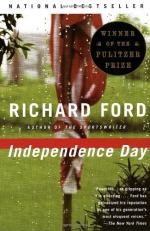|
This section contains 685 words (approx. 3 pages at 300 words per page) |

|
SOURCE: A review of Independence Day, in America, Vol. 173, No. 19, December 9, 1995, pp. 26-7.
[In the following review, Bonner praises Ford as a storyteller and calls Ford's Independence Day "a work at the edge of philosophy but far enough away that its art still lives."]
"I was trying to address the country in as large a way as I can imagine—intellectually as well as spiritually. It was the way I defined myself a challenge," observed Richard Ford about his novel Independence Day during a New Orleans Times-Picayune interview. The mission suggested in his comments gives his fiction a life beyond the story and makes his narrative part of a tradition of consciously merging stories with ideas.
American literature through the late 19th century, as represented by Hawthorne and Melville, for example, repeatedly gives us writers engaged with balancing these elements. The works of Emerson, too, remind us that...
|
This section contains 685 words (approx. 3 pages at 300 words per page) |

|


